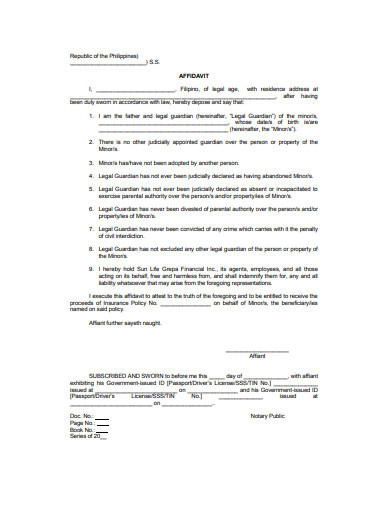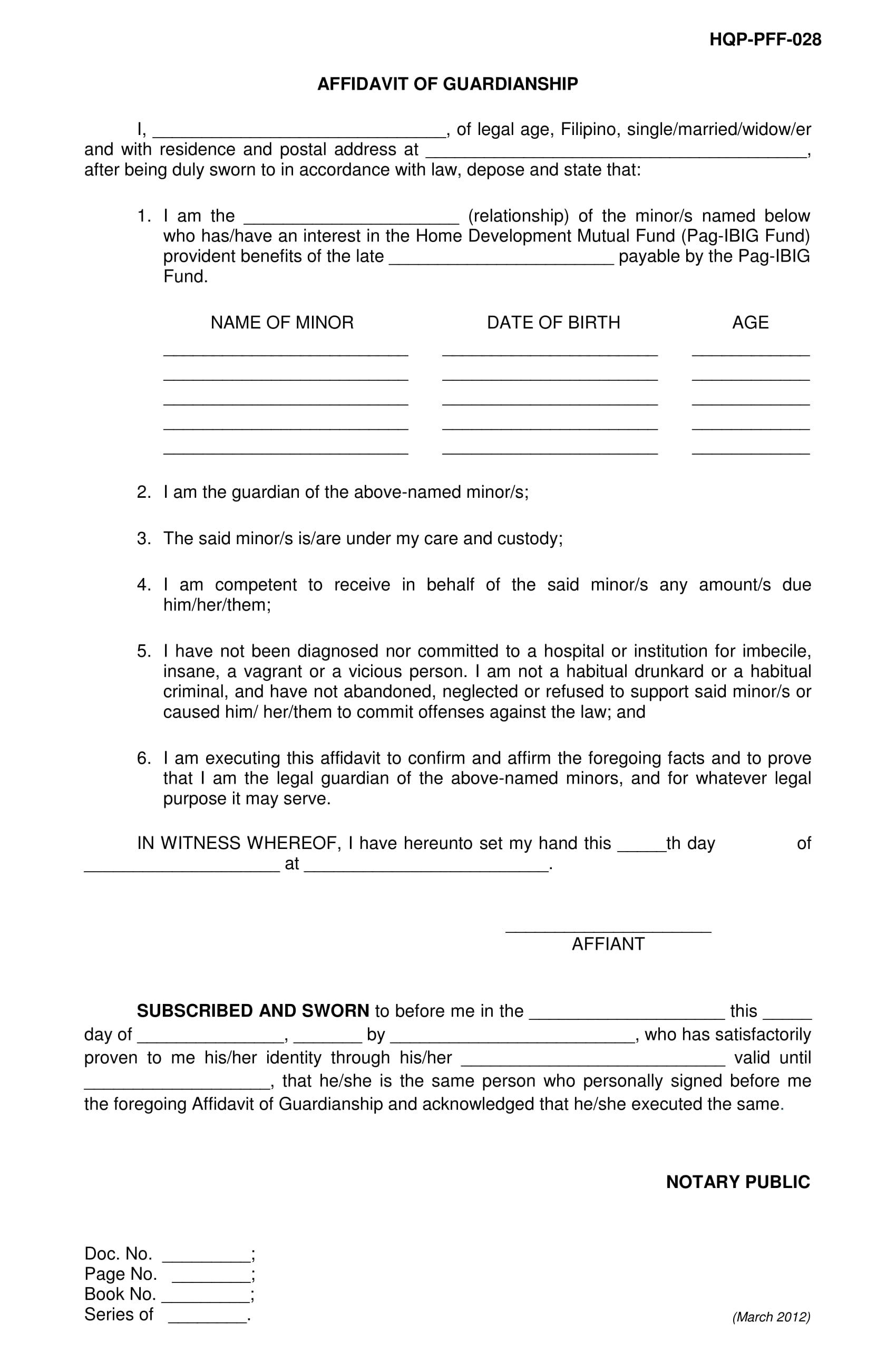Imagine a loving grandparent stepping in to care for their grandchild—a scenario that, while heartwarming, often brings complex legal questions. Ensuring that a grandparent can legally provide care and make crucial decisions for a child in the absence of their parents requires a carefully crafted legal document: the Affidavit of Guardianship.

Image: www.vrogue.co
This document is more than just paperwork; it’s a lifeline for both grandparents and grandchildren, providing a legal framework for a stable and loving environment. Whether facing a crisis, unexpected event, or simply wanting to be prepared for the future, understanding the nuances of an Affidavit of Guardianship is crucial for any grandparent eager to protect their grandchild’s well-being.
Defining the Affidavit of Guardianship
An Affidavit of Guardianship is a sworn statement, typically notarized, that appoints a grandparent (or another designated individual) as the legal guardian of a child. This legal action grants the appointed guardian the authority to make decisions concerning the child’s education, healthcare, finances, and overall well-being.
Key Components of an Affidavit of Guardianship
A comprehensive Affidavit of Guardianship typically includes:
- Clear Identification: Names, addresses, and contact information of the child, the designated guardian, and the child’s parents (if applicable).
- Declaration of Intent: A statement explicitly affirming the grandparent’s desire to be appointed as the legal guardian of the grandchild.
- Scope of Guardianship: Clear articulation of the guardian’s responsibilities, including custody, education, medical care, and financial matters.
- Parental Consent (If Applicable): If the parents are still living, their written consent, often notarized, is essential for the Affidavit to be legally valid.
- Notarization: This step ensures the legitimacy of the document by verifying the identity of the affiant and the authenticity of their signature.
Situations Warranting an Affidavit of Guardianship
While often viewed as a proactive measure, an Affidavit of Guardianship can become critically important in various scenarios:
- Single Parent Passing: In the unfortunate event of a parent passing away, an Affidavit can allow the surviving parent to designate a grandparent as the guardian without going through a lengthy court process.
- Parental Incapacitation: If a parent faces a prolonged illness, mental health issues, or substance abuse problems, an Affidavit can ensure that the child’s needs are met by a trusted grandparent.
- Parental Abandonment: When parents are absent or unwilling to fulfill their parental duties, an Affidavit can provide a legal framework for grandparents to step in and provide care.
- Anticipating Future Challenges: In situations where parents are aware of potential challenges, such as a serious illness or upcoming deployment, they can proactively establish an Affidavit of Guardianship to prepare for the possibility of their absence.

Image: www.vrogue.co
The Process of Establishing an Affidavit of Guardianship
The process of obtaining an Affidavit of Guardianship involves several key steps, which may vary slightly depending on state laws and circumstances:
Step 1: Consultation with an Attorney
The first and most crucial step is to seek legal advice from a qualified attorney. An attorney can provide guidance on the specific requirements in your state, advise on the wording of the document, and ensure it complies with all legal standards. They can also offer valuable advice on potential challenges and help navigate the legal system.
Step 2: Preparing the Affidavit
The attorney will draft the Affidavit of Guardianship, ensuring it accurately reflects the specific needs and wishes of the individuals involved. This will include details about the child, the designated guardian, the scope of guardianship, and any necessary parental consent forms. The Affidavit will be thorough and specific to the individual circumstances.
Step 3: Witnessing and Notarizing
Once the Affidavit is drafted, it will be signed by the parties involved, typically the designated guardian, and any necessary witnesses. The Affidavit will then need to be notarized by a certified notary public, confirming the validity of the signatures and ensuring the document’s legal standing.
Step 4: Registration and Legal Recognition
The location where the Affidavit is registered and recognized varies by state. Some states require the Affidavit to be recorded with the probate court, while others may have specific offices dedicated to guardianship documents. Consult with your attorney to determine the necessary steps in your jurisdiction.
Important Considerations for Creating an Affidavit of Guardianship
While an Affidavit of Guardianship offers a valuable tool for grandparents seeking to provide for their grandchildren, it’s crucial to approach the process with careful consideration.
Considerations for Grandparents
Before embarking on this legal path, grandparents should reflect on the following:
- Capacity to Care: Grandparents should honestly assess their physical, emotional, and financial capacity to provide for the child’s needs, both in the present and long term.
- Relationship with the Child: A strong, loving relationship with the child is essential, as well as the ability to build upon it and nurture it as the child grows and develops.
- Legal Counsel: Consulting with a qualified attorney throughout the process is vital for ensuring the legal framework is sound and protects the best interests of the child.
Considerations for Parents
Parents who are considering designating a grandparent as guardian should:
- Communicate Openly: Have open and honest conversations with the grandparent about their ability to meet the child’s needs.
- Legal Representation: Consult with a child custody attorney to ensure that the Affidavit of Guardianship aligns with their wishes and the child’s well-being.
- Future Planning: If possible, include specific directives about the child’s upbringing and any preferences regarding education, religious upbringing, or cultural traditions.
Affidavit Of Guardianship Of The Grandchild
Navigating the Legal Landscape with Confidence
An Affidavit of Guardianship is a vital legal tool, offering a path for grandparents to provide secure and loving care for their grandchildren when circumstances require it. By understanding the intricacies of its purpose, process, and considerations, both grandparents and parents can enter the legal landscape with confidence, knowing that the child’s best interests are at the heart of the decision.
Remember, seeking legal advice from a qualified attorney is essential. They can provide personalized guidance, ensure the Affidavit meets all legal requirements, and offer valuable insights into navigating the often complex legal system.






